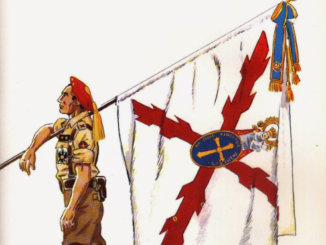
Parliament pronounced by Daniel Herrán at the lunch of the central events of the Martyrs of the Tradition celebration in Madrid (Video of the parliament, here).
Reverend Fathers, members of the Political Secretariat of His Royal Highness, presidents of Circles, co-religionists all:
When Saint Thomas explains the second petition of the Lord’s Prayer (Thy Kingdom come), he teaches us that sometimes a king “has only the right of the kingdom or of the lordship”, although he might not de facto rule in it. This happens because “the dominion of that kingdom is not proclaimed, because the people of the kingdom are not yet subject to him. His kingdom, says the saint, will be proclaimed when the people of the kingdom submit to him”.
As a political collation of this commentary, we may appraise some of the principles of the Holy Cause. All government presupposes two elements: active dominion and adherence. That is to say, the right of the authority to reign and the duty, owed in justice, to obey.
The saint does not speak about pretenders or candidates: he is in justice the king, as Don Sixtus Henry is. We, who are his subjects, fight so that his right prevails. Although this age only speaks of rights, it does not know that these go beyond the individual. For the natural and Catholic man not only knows that they are relative to duties, but that duty takes precedence over right in the order of our actions, in what concerns us.
Now, with the right of the king something analogous happens to what happens with the common good. In the common good are contained all the particular goods of those who belong to a community. Well then: the right of the king contains all the rights of the fatherland, all the rights of the subjects. The right of the father; the right of the mayor; the right of the chief; the right of the lord; the right of the master; the right of the judge. All of them.
I took the occasion that we are in the octave of Saint Thomas to remember him. I will now remember a distinguished martyr. Although it was not a cruel martyrdom in terms of bloodshed, he was martyred in persecutions, in scorn, in ostracisms, in suffering many injustices. Harassments heroically suffered for having defended the true faith and the rights of Spain.
Don Rafael Gambra states that Spain is one of the countries most chastised by the revolutionary desolation. He tells us that this is due to the nefarious diligence of Francoism and the subsequent regime of ’78. But don Rafael Gambra also points where the sources of its restoration lie.
If we have said that our duty takes precedence in our actions, how are we to ensure that those who are not subject to the king obey him? What must be done? Restoration necessarily passes through reinvigorating the family, beginning with our own, with parental authority; with the restoration of its patrimony. It passes through building neighborhood relationships, family boards, without falling into the communitarianist error. It passes through trying to solidify professional relationships, and so many other political and pre-political tasks that can be prepared.
How can this be done? Well, it is possible to push in this direction despite the difficulties of the present. But not without two requirements: In the first place, that we adhere to the purely political, regal direction, so that these initiatives do not dissolve in particularisms; and so that they are not preyed upon. Secondly, it is precise that each one of us should contribute to this common work as much as possible: each one in his place, according to his duties of state and his loyal position in the Communion.
The blood of our martyrs has been shed to water these tasks. Martyrdom does not ask only for memory, only for tributes: it demands fruits. We must receive and put this martyr’s verve to cement and flood these families, our families, those neighborhood relationships, those works. This is how we will work for the Catholic and monarchic restoration of Spain.
Thank you very much.




Deje el primer comentario